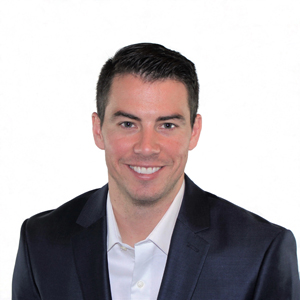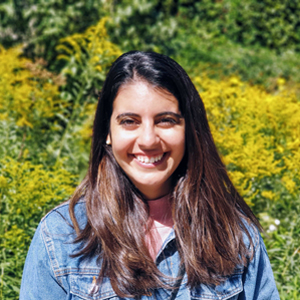Future Leaders
This step-changing funding programme will fund the future leaders of scientific and clinical research into brain tumours.
Over 12 years, this award could provide the right researcher with up to £1.8 million in funding and the support needed to set up their own lab.
We established this funding to support and encourage the future leaders of scientific research in the brain tumour field. We’ll identify excellent early stage academic and clinical researchers and provide support so they can establish themselves as leading researchers in our field.
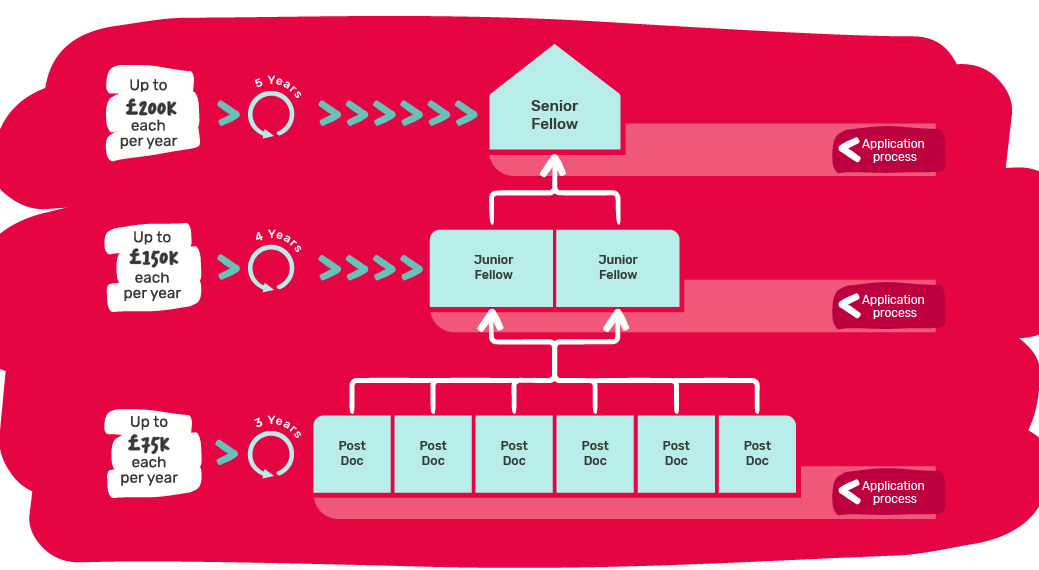
Key Dates
Future Leaders (Postdoctoral Fellowship) 2025
Stage 1 application (LOI) open: 7 May 2025
Stage 1 application (LOI) deadline: 2 July 2025, 1pm BST
Stage 2 full applications invited: 15 October 2025
Stage 2 full applications close: 26 November 2025, 1pm GMT
Funding decisions: April 2026
Junior Fellows 2025
(Only the Future Leaders 2022 cohort are eligible to apply)
Call for applications open: 5 March 2025
Call for applications closes: 16 April 2025, 1pm BST
Funding decisions: September 2025
Who are our current Future Leaders?
Future Leaders 2024
Here are the research projects that were funded as part of our Future Leaders grants that were awarded in 2024.

Dr. Antonio Fuentes-Fayos
Identifying unique protein markers in brain tumours to develop new immune-based treatments
Dr. Antonio Carlos Fuentes-Fayos is focused on finding better treatments for high grade brain tumours by exploring the tumour ‘immunopeptidome’, which refers to tiny pieces of proteins, or ‘protein markers’, that can activate the immune system to fight cancer cells.

Dr. Bo Sun
Using T-Cell signals to detect and track gliomas
Dr Bo Sun’s project is looking at developing a way of using blood samples to predict whether a patient’s tumour might regrow following treatment. Bo hopes to be able to develop a way of detecting the presence of tumour regrowth earlier after surgery.

Dr Charlotte Eaton
Understanding the origin of meningiomas to develop targeted treatments
Dr Charlotte Eaton is aiming to improve knowledge of the origin of meningiomas by using several key laboratory techniques. She will use a combination of DNA and RNA sequencing which will help the researcher to pinpoint potential drivers of disease.

Dr. Emily Bates
Exploring the use of “smart viruses” to treat glioblastoma
In this project, Dr. Emily Bates is focusing on adapting viruses to specifically target GBM cells. Since GBM cells are able to “hide” from the immune system, Dr. Bates wants to use these viruses to target GBM cells and deliver immunotherapy drugs.

Dr. Mathew Clement
Using the immune response to target glioblastoma
Dr Mathew Clement’s research has shown that a substance called Interleukin-10 (IL-10) is produced in large amounts in GBM. By blocking IL-10 with antibodies, Dr Clement believes this could allow the immune system to fight the cancer.
Future Leaders 2022
Here are the research projects that were funded as part of our Future Leaders grants that were awarded in 2022.
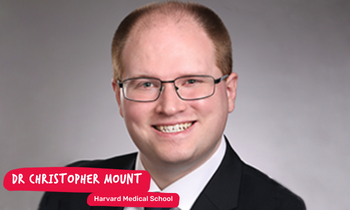
Dr. Christopher Mount
Engineering cells of the immune system to target the complex mixtures of cells in adult and paediatric gliomas
Dr. Mount from Harvard Medical School is developing a new approach to treat gliomas by engineering immune cells to specifically identify and destroy multiple types of cells within the tumour.

Dr. Mara De Martino
Shining a light on the role of lipid metabolism as a barrier to successful brain tumour treatment
Dr Mara De Martino at Weill Cornell Medicine is investigating the connection between lipid metabolism and immune escape in glioblastoma. Her goal is to identify molecules that promote treatment resistance and develop novel treatments targeting lipid pathways to enhance immunotherapy effectiveness against brain malignancies.

Mr Ola Rominiyi
Investigating DNA repair on a cell-by-cell basis in glioblastoma
Dr. Ola Rominiyi at the University of Sheffield is researching DNA repair in glioblastoma on a cellular level to identify treatment vulnerabilities. His work aims to create new treatment strategies with DNA repair inhibitor drugs that are more effective and have fewer side effects.
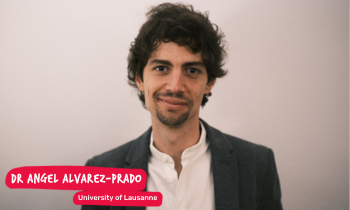
Dr. Angel Alvarez-Prado
Hijacking an innate immune mechanism present in all malignant cells
Dr Angel Alvarez-Prado at the University of Lausanne is developing a novel therapeutic approach to treat glioblastoma by inhibiting ADAR1 in combination with TME-targeted immunotherapies, targeting cancer cells and their supporting microenvironment.

Dr. Jessica Taylor
Identifying a specific subtype of brain tumour without surgery
Dr Jessica Taylor at the University of Cambridge is developing a novel strategy called ADCIPs to identify and treat WNT-medulloblastoma, a highly curable brain tumour in children, without the need for surgery.
Future Leaders 2020
Here are the research projects that were funded as part of our Future Leaders grants that were awarded in 2020.

Dr Tyler Miller
Understanding how immune cells block glioblastoma treatments
In this exciting project, Dr Miller and his team will focus on immunosuppressive cells found in glioblastomas, which are currently believed to be preventing breakthrough immunotherapies from attacking brain tumours.

Dr Veronica Rendo
Making MDM2 resistance a thing of the past
Dr Rendo is striving to understand how laboratory models of glioblastoma (GBM) become resistant to MDM2 inhibitors and to use this understanding to propose combinations of drugs to overcome or prevent the occurrence of resistance.
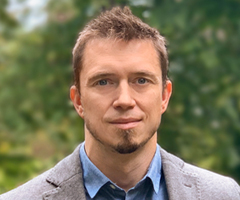
Dr Spencer Watson
Targeting treatment damage to stop recurrence
Dr Watson’s work will explore whether glial scars, formed in response to injury such as radiotherapy or surgery, provide a microenvironment that tumour cells can use as a safe space to relapse from.
Junior Fellows 2023
We have awarded our first two Junior Fellowships – the second stage of our Future Leaders funding programme.

Dr Tyler Miller
Reprogramming glioma-associated myeloid cells to enable effective
Dr. Tyler Miller is a Research Fellow at Dana Farber Cancer Institute and Massachusetts General Hospital, Boston, USA. Tyler is mentored by Professor Bradley Bernstein.

Dr Spencer Watson
Multi-Omic Analysis of Environment-Mediated Glioblastoma Dormancy and Recurrence
Dr Spencer S Watson is a Postdoctoral Researcher in the Ludwig Institute for Cancer Research at the University of Lausanne Department of Oncology, Switzerland. Spencer is mentored by Professor Johanna Joyce.
Information for applicants
- Purpose and scope
- Patient and public involvement
- Eligibility criteria
- Assessment criteria
- Essential reading
- How to apply
Purpose and scope
The funding programme runs in three parts (Postdoctoral Fellowship, Junior Fellowship and Senior Fellowship), with only those entering the programme as postdoctoral fellows eligible for the subsequent grants.
Up to six postdoctoral fellowships will be awarded, for an investment of up to £75,000 each per year for three years. The initial application is to be made by a strong mentor who will guide them through this initial term.
After three years these postdoctoral fellows will be invited to submit an application for a four year Junior Fellowship, totaling up to £600,000, to support themselves and a research associate in a host laboratory. During this time, fellows should develop as independent researchers and begin to build their own groups.
In the third stage of funding, the Junior Fellow cohort will be invited to apply for a five year Senior Fellowship, totaling up to £1million, to support the applicant and a small research group. Applications that have a UK institution as the location of the senior fellow’s research will be looked upon favourably.
We encourage a change in host institution and mentor at each stage to facilitate the applicant’s development into a fully independent group leader.
All rounds will be competitively assessed and applicants will be interviewed, either in person or via video conferencing.
Public and patient involvement
To obtain input from those affected by brain tumours, we strongly recommend that applicants access our Involvement Network (IN) for public and patient involvement. In order to receive feedback from the IN, please allow for a minimum of three weeks turnaround time.
Future Leaders
-
- • All grant applications must focus on at least one of the research priorities highlighted in our Research Strategy ‘Accelerating a Cure’.
- • The named postdoctoral fellow must, at the date of the call deadline, be in possession of a doctoral degree.
- • Clinicians moving into full time laboratory based research are welcome to apply, providing they also have a PhD.
- • Clinicians wishing to spend part of their time on laboratory based research and complete the fellowship alongside their clinical duties will also be considered on a case by case basis. A minimum of 50% FTE must be spent on the fellowship.
- • The named postdoctoral fellow’s previous research need not be in the brain tumour field, but they must be able to demonstrate how they will apply their prior learning to the study of brain tumours.
- • The Mentor must hold an employment contract beyond the period of the grant.
- • The Host Institution should provide additional transferable skills training to the fellow, such as planning and writing of publications, project management, supervision of junior lab members and presentations in conferences and to the general public.
- • This scheme is initially open to international researchers. However, Senior Fellowships must be taken up at a UK university or institute.
-
Potential of the Fellow
- The fellow must be appropriately trained and be able to demonstrate a strong track record in scientific research.
- The fellow should be well suited to carry out the planned studies.
- Applications must contribute to the development of the fellow, allowing them to reach a position of professional maturity and independence.
- At all application stages, fellows must evidence their willingness to relocate to the UK to take up a Senior Fellowship.
Expertise of Mentors
- Mentors must be well positioned to provide fellows with appropriate training, supervision and mentoring to help them establish themselves as independent researchers.
- There should be identifiable programmes for personal development at the Host Institutions that the fellow can be enrolled upon.
Methodology
- Projects must have a sound approach and methodology in order to address the questions raised while exposing the fellow to different techniques.
Potential for patient benefit
- Applications should demonstrate a potential pathway for the research to lead to patient benefit and the anticipated impact of this.
- Applications with a clear path to clinical application will be strongly favoured.
Value for money
- Applicants should justify how the requested funds are essential for the work and explain how the project represents value for money.
- Leveraging matching funding from other organisations will be favoured.
The Brain Tumour Charity is a member of the Association of Medical Research Charities (AMRC) and adheres to its principles of peer review. All applications will be considered by our Biomedical Scientific Advisory Board (Biomedical SAB) alongside lay representatives of people affected by brain tumours.
Please read the following documents before applying for funding
FL Letter of Intent- Guidance Document – PDF
Please take note of, and allow sufficient time for, the approval steps required to complete the submission process. We cannot guarantee that late submissions will be accepted.
FL Full Application – Guidance Document 2025 – PDF
Guidance for applicants invited to submit a full application. Please take note of the approval steps required after the lead applicant submits through the portal.
Junior Fellows Guidance Document 2025 – PDF
Guidance for members of the Future Leaders cohort to submit Junior Fellows applications.
Further essential reading
There are other documents you must read before applying to our grant rounds. These include, but are not limited to Grant Conditions and Finance Guidelines. These documents can be found by following the link below.
How to apply
All applications should be made through our grant management portal.
If you need help creating or accessing your account please contact the Research Team on research@thebraintumourcharity.org
Further information
If you would like to discuss your application or need any information, please contact the Research Team.
Success rates:
Rolling success rate from LOI to Invited to submit a full application for the previous 3 rounds: 43%
Rolling success rate from full application to funding for the previous 3 rounds: 37%
E-mail: research@thebraintumourcharity.org
Phone: +44 (0) 1252 418190










